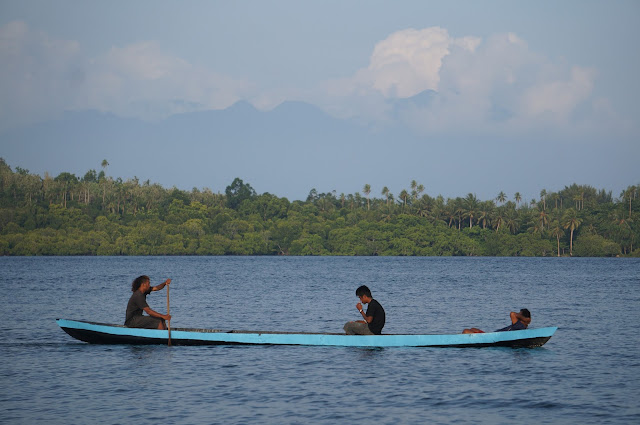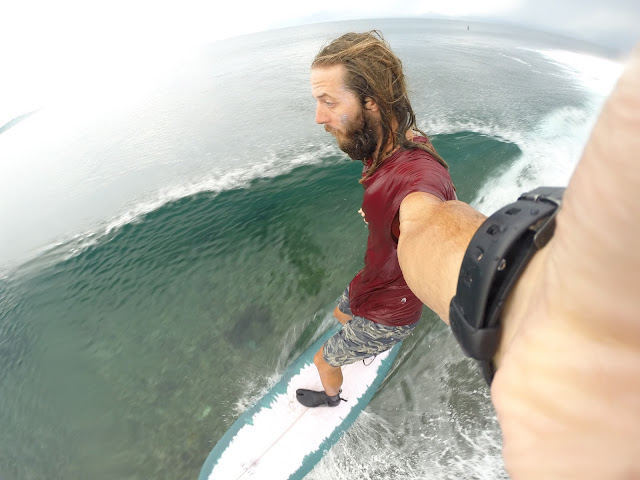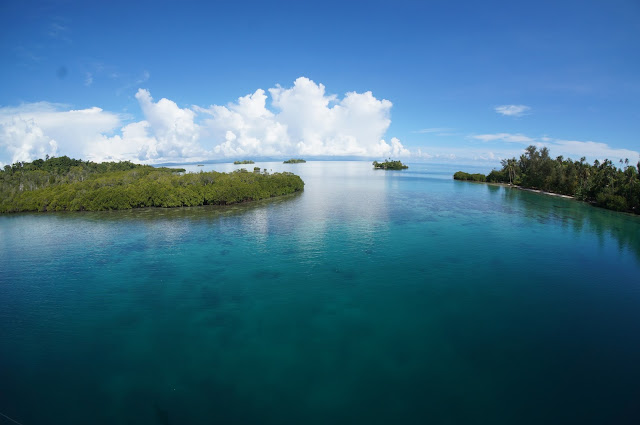We expected Gizo to have great resources for re-supplying, but it was much worse than Vanuatu. Luckily we had bought quite a lot of dry goods or canned food in Port Vila, that we wouldn’t need much of that for awhile. The market provided with plenty of fresh fruits and veggies, and the fish market was very good, too.
The other side of the island had nice beaches and very good surf, so we would take the transport truck at least every other day over there.
I loved surfing with the local kids. Typically one of them would see me paddling out, so they would go and grab their board and paddle out with me. There were also a bunch of local guys about my age who were really great surfers. They said that in 1995 a pilot stopped here and was the first one to surf the break. Since then they have depended on other surfers donating boards to support their surfing habits. One guy named Tommy Lee surfed all the time. Often, he would already be surfing when I got there, and would still be surfing when I left. He would pick up odd jobs if he needed cash, but otherwise he just tended is garden, kept up the maintenance on his house, and took care of his family. A positively good dude, happy to be living this life.
We had just about ran out of water since leaving Vanuatu, and expected that we could find water in Gizo, and since the rainy season was coming on we thought we would be fine collecting rain water. It turned out that there was no safe drinking water source for us. We were buying bottled water in the stores, it wasn’t raining at all, and it sounded like there was a water shortage all over the island. We noticed guys with water jugs in their canoes paddling through a gap in the mangroves, so I thought we’d investigate. I couldn’t find exactly where they had gone, so I started asking people, and was directed to a pipe that was fed by a natural spring up the hill. I asked if this was drinking water, and was told it was by one guy, and that it wasn’t by another. I remember reading about a water treatment technique that uses UV light to kill bacteria. Use a 1 liter plastic bottle, fill it with water clear of sediment, and place it in the sun for 6 hours. After that it is drinkable. We had saved all of our plastic bottled we’d been buying in the store, so by first filling our jerry cans and bringing them to the boat, we then filled our plastic bottles and placed them on deck in the sun. We did this everyday until we had filled our tanks. We also used this method in other parts of the Solomons with questionable water sources, until we had the opportunity to buy a filter and have it shipped.to us in Honiara.
When we later returned to Gizo, after being gone for 3 months, I felt quite warm to the place. Fast internet aloud us to catch up with family, learn about the latest disasters, and find out about more ways The Man is fucking shit up.
We took a break from Gizo town by sailing 8 miles and anchoring near the northern part of the island. We were at the top of a little bay that gave us access to lots of little islets and reefs to snorkel, fish, and hang out. It was here that we finally got some rain to collect for water.
The surf report looked good, but since we were now on another part of the island, we had to figure out a new way to get there. The surf break was about eight miles around to the west of the island, but that would be a really long trip in the dinghy, so we took the dinghy just four miles to the village at the and of the road, then caught a truck to go the rest of the way. Apparently there was supposed to be a charge for leaving our dinghy on the beach where it was, but the landowner was on another island, so we didn’t have to pay. Really, it was just a public beach. The next day we decided to do the same thing. When we got to the village, the weather was really nice, so we decided not to deal with possible charges and just take the dinghy the extra four miles to the surf. We had a great surf, but by the afternoon the wind had picked up out of the north, the direction we had to go to get back to the anchorage. Up till this point, this would have been the longest trip we had taken in ol’ ding ding. So we bashed our way through the wind chop all eight miles back to the anchorage. The ride was so bumpy we both chafed our bottoms. Added to the tough ride was the fact that I was nearly out of fuel. But we made it, and have continued to push the limits of our dinghy.
We celebrated Serena’s birthday with an amazing day of snorkeling, fishing, and hanging out on our own little island. The water was so glassy and clear we would be racing over the reef, sneaking up on rays and sharks. Our surroundings taking our breath away.
Out here we caught our first squid. I wasn’t actually fishing for squid, but it seemed to like my lure, grabbed on to it, and I pulled it into the boat. Simple to clean, and super tasty fried up.






































































